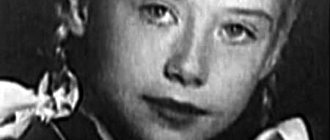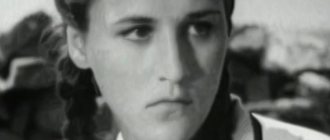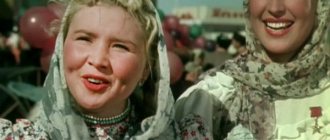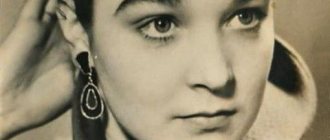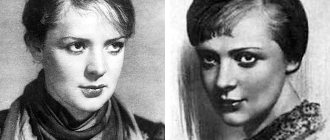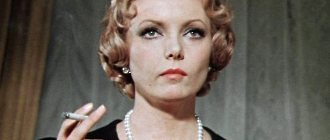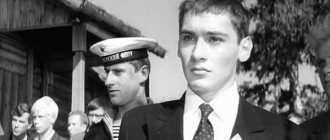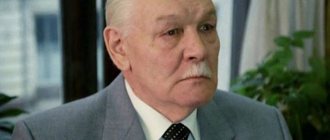She was young and talented. The whole world seemed to be at her feet, and the future promised extraordinary success. In the 50s, her name was already in the first echelon of actors. She was admired and offered to play the main characters. But this future, in fact, turned out to be more than cruel to her. This woman literally ended her life at the bottom. Even friends and relatives turned away from the actress. She died at just thirty-eight from alcoholism and exhaustion. Her name was Isolda Izvitskaya. The biography of this beautiful but unhappy woman will be told to the reader in the article.
Parents of the future actress
Isolda Izvitskaya (the nationality of the actress was rarely discussed in the media, for this reason she is unknown) was born in the early summer of 1932 in Dzerzhinsk, in the Nizhny Novgorod province. At this time, the city began to turn into one of the industrial centers. Several large defense enterprises appeared. Isolde’s father had just started working on one of them.
By profession he was a chemist. As for the mother, literally everyone knew her. Since she headed the Palace of Pioneers. At that time, this institution was the only center of culture in this city.
Let us note right away that the parents of the future actress had absolutely nothing to do with the world of art.
Children's time
According to memoirs, young Isolda Izvitskaya grew up as an active, spontaneous and responsive girl. When she started going to school, she had her first fans. They accompanied her and stood for hours outside her apartment.
Considering that her mother headed the city Palace of Pioneers, young Isolde had to try all the sections and circles that were under her mother’s supervision. They say she always succeeded. She understood perfectly and learned with ease. She painted, sewed, and even glued airplane models. But, first of all, she liked to play in plays. The girl specially enrolled in a drama club. True, she did not have to perform on stage very often.
Of course, young Isolde, whenever possible, visited cinemas and watched films, watching her idols play. At that time, she was delighted with Lyubov Orlova and Valentina Serova. In fact, the world of cinema attracted her terribly. Isolda Vasilievna Izvitskaya passionately dreamed of filming and hoped that one day she would also become famous. But so far she hasn’t even thought about telling about her dream not only to her parents, but also to her friends.
Out of spite
In 1950, the future actress received a certificate of maturity. By this time, she had already matured a daring plan: she should enter a theater university. Without telling anyone, the girl bought a ticket to Moscow. She hoped that the capital would not disappoint her expectations. Of course, Isolde understood perfectly well that her parents would not allow her to leave for the capital. But she was also sure that if she did not become a student at a theater university, she could easily return to Dzerzhinsk and work, like many, at defense factories.
While in Moscow, the first thing Isolda did was submit documents to VGIK. It was then that she informed her parents about her decision. And they, surprisingly, gave her the opportunity to try herself. They did not put any obstacles in the way of the future actress. Perhaps they sincerely hoped that their daughter would return after all, having failed the competition. But this did not happen.
After the entrance exam, happy Isolde sent a telegram saying that she had entered the university on her first try.
The future actress ended up taking a course from brilliant teachers O. Pyzhova and B. Bibikov. And she studied together with such magnificent actors as Yu. Belov, N. Rumyantseva, R. Nifontova, M. Bulgakova, V. Vladimirova, D. Stolyarskaya.
In 1955, having received her diploma, Izvitskaya became a professional actress.
Biography
Isolda Vasilievna was born on June 21, 1932 in the city of Dzerzhinsk.
Her father was a chemist, and her mother worked as a teacher, taught acting and directed the local Palace of Pioneers. Isolde often visited her mother at work and watched the young artists. When she grew up, her mother enrolled her in a drama club. The girl really enjoyed studying there, and since childhood she dreamed of a big stage.
After graduating from school, Isolde went to Moscow secretly from her parents and submitted documents to VGIK. She was accepted and enrolled in a course with Olga Pyzhova and Boris Bibikov.
First roles
The actress began to be invited to filming. True, so far she has only acted in episodic roles. Izvitskaya took part in such films as “Anxious Youth” and “The Bogatyr Goes to Marto.” By and large, thanks to her participation in the filming process, she began to feel much more confident. In other words, the young actress was gaining experience.
In 1955, she received a fairly prominent role in the film “First Echelon”. Its director was the famous Mikhail Kalatozov. In the film, Izvitskaya reincarnated as Anna Zalogina. By the way, during this filming she began dating twenty-year-old actor Eduard Bredun, who was involved in the film in a cameo role.
At that time she lived with another actor. His name was Radner Muratov. They lived under the same roof for almost three years, and this marriage was unregistered. As a result, the romance was exhausted, and Isolde plunged headlong into a new relationship with Bredun. Subsequently, he will become her official husband. Perhaps this marriage turned out to be the tragic and main mistake of the actress. But we will return to this a little later.
Elena Mayorova, Natalya Kustinskaya, Izolda Izvitskaya: actresses who were killed by alcohol
Elena Mayorova // Photo: Still from the film
As they say, female alcoholism is extremely difficult to treat. It was the addiction to drinking that destroyed many Soviet and Russian movie stars. Today, May 30, Elena Mayorova could have turned 61 years old, but the star of the film “Lost in Siberia” died under tragic circumstances in 1997.
Elena Mayorova was born in Yuzhno-Sakhalinsk into a working-class family. From an early age, the girl wanted to be an actress and went to a club at the local pioneer house. In 1976, Mayorova managed to enter GITIS. Her mentor was Oleg Tabakov. During her first year of study, Elena overcame her speech impediment and learned to pronounce the letter “r”.
Her film debut was her role in Ilya Frez’s film “You Never Even Dreamed of...”. The actress had a spectacular appearance and was not deprived of talent, so she was willingly invited to appear in many films of the 80s and 90s.
Rumor has it that Mayorova’s first student marriage was fictitious. She married Vladimir Chaplygin, but her mother-in-law did not accept her. Probably, Elena needed this union so as not to leave for assignment to her native land. The woman with sad eyes was admired by many famous directors, and Oleg Efremov even allowed her to argue with him. She could even have had a love affair with the actor, but Elena was already married again.
Elena Mayorova was almost Efremov’s muse // Photo: Still from the film
Her second husband, Sergei Sherstyuk, was an artist, but his work did not bring in much money. It so happened that gradually he literally sat on Mayorova’s neck: she worked for two. The husband started drinking, and later his wife joined him.
“Lena was ready to solve all of Serezha’s problems. But he himself did not want to hit a finger on a finger to do at least something. Lena was diagnosed with infertility after suffering from tuberculosis in childhood. She repeatedly told me: “Why do I need children? I have a big child, Sherstyuk!” And the big child still didn’t want to grow up,” said Tatyana Dogileva, who knew Elena well, about the couple’s relationship.
The actress tried to do everything efficiently: she devoted herself to the role without reserve, and never took alcohol in the theater after the performance. But when she drank too much, the consequences could be anything - she could scream, get into fights, and several times tried to commit suicide. One day she joked unsuccessfully: after emptying the packets of sleeping pills, Elena went to bed. Then the husband was shocked, although in fact she only took one pill.
Mayorova in the series “On Knives” // Photo: Still from the film
In 1997, Mayorova received the role of an adult woman who falls in love with a young man in the film “Strange Time.” Her partner was Oleg Vasilkov. Mayorova developed real feelings for her young colleague. She wrote him love messages, but did not want to leave her husband.
Mayorova was advised to seek treatment for alcoholism, but she denied that she needed help. “It was just that literally a glass of vodka was enough for her to aggravate her condition. From a minimal dose of alcohol she fell into a very severe depressive state. This bothered me greatly, and for several months I tried to take her to a narcologist who treated me for alcoholism. But both she and Seryozha were against it. Now I feel guilty that I didn’t take her to the doctor. Then, perhaps, everything would have turned out completely differently,” recalls Dogileva.
Marina Shimanskaya spoke for the first time about the sudden death of Elena Mayorova
Elena died on August 23, 1997. The day before, she and her husband had a big fight, so he left for the country. Mayorova probably tried to calm herself down with alcohol. She canceled work on the painting “On Knives,” saying she was ill. Elena also refused to let Dogileva visit her, explaining that she had a contagious sore throat.
According to one version, the movie star went out to smoke in the stairwell. Due to careless handling of fire and a kerosene lamp, her clothes caught fire. Mayorova didn’t know what to do. Then her hair and skin caught fire. In this form, she ran into the Mossovet theater, next to which she lived. The arriving doctors were unable to save her, as 85% of the surface of her body was burned. As it became known, she managed to send a message to Oleg Efremov’s pager, which said: “I’m dying! Come".
Mayorova was buried at the Troyekurovskoye cemetery. Her husband Sergei adhered to the version that his wife committed suicide because at the age of 39 she no longer wanted to live. After her death, he lived only nine months and died of cancer.
Natalya Kustinskaya
Natalya Kustinskaya // Photo: Still from the film
The star of the film “Three Plus Two” Natalya Kustinskaya lived a long and eventful life. The actress was married six times, but the title of “black widow” was assigned to her, since she outlived almost all of her spouses.
Kustinskaya always competed with her colleague, Natalya Fateeva, and once Natalya Nikolaevna stole her colleague’s husband, cosmonaut Boris Egorov. Then, as the star of the film “Ivan Vasilyevich Changes His Profession” said, Fateeva seemed to curse her. “She couldn’t even establish relationships with her own children. I am also alone, but we came to our loneliness along different roads. Unlike Natasha Fateeva, I have always strived to live by feelings. I was only looking for love, but I didn’t “hunt” anyone, I didn’t run after anyone,” admitted Kustinskaya.
Natalya Kustinskaya was popular with men // Photo: Still from the film
The actress's problems with alcohol began after a series of deaths in the early 2000s. In 2002, Natalya Kustinskaya’s fourth husband, MGIMO professor Gennady Khromushin, died. Then her little grandson and son passed away. “After losing my son, being left completely alone, I began to get seriously ill. My legs gave out and problems with my spine appeared. And fate seemed to take pity on me and sent consolation - Volodya, my last husband. But then she took it away, like everyone else. Five years later he died of transient cancer,” Kustinskaya recalled.
Tamara Semina about the character of Natalya Kustinskaya: “She gave a damn about everything”
The movie star became depressed, drank a lot, but did not suffer from binge drinking. Nevertheless, the addiction negatively affected the star’s appearance and provoked a number of diseases. In recent years, she suffered from several ailments: polyarthritis, radiculitis, diabetes and pneumonia. On December 13, 2012, after suffering a stroke at the age of 74, the actress died without leaving a coma. She was buried at the Kuntsevo cemetery next to her son.
Valentina Serova
Valentina Serova in the film “Wait for Me” // Photo: Still from the film
The star of the film “Hearts of Four” Valentina Serova was born in 1919, but later the date was corrected to 1917. It was rumored that she did it herself so that she could be accepted into the theater arts college. Even before the war, in 1938, Valentina married test pilot Anatoly Serov. However, their happiness was short-lived; he crashed on May 11, 1939, when Valentina was carrying her son under her heart. She named the boy Anatoly after his father.
But the actress was not alone for long. She captivated the poet Konstantin Simonov, author of the legendary work “Wait for Me.” They got married, but Valentina’s husband did not like her child from her first marriage, so the boy was sent to a boarding school in the Urals. Konstantin and Valentina had a daughter, Masha, in 1950. But the appearance of a common heir did not help them maintain their relationship.
In the late 1940s, the actress began to abuse alcohol, which negatively affected not only her marriage with Simonov, but also her work in the theater. After Masha was born, she went to the Maly Theater, although she had previously served in Lenkom. Her son from his first marriage had his fate literally broken: Anatoly served time for robbery and started drinking early.
Simonov took revenge on Valentina by suing his daughter. Despite the fact that the child lived with the actress’s mother, she was not allowed to see Masha because of her addiction to alcohol. “One day Valentina Vasilievna called me: “Rimma, come and save me.” It turned out that Tolya went on a rampage and started cutting down the doors in the apartment. I felt scared myself, I thought: well, he’ll hit me with an ax too. And when Tolya was imprisoned, some boy began to live with Serova. I remember a drunk Valya opening the door for me and saying: “Meet Rimma, this is Syusya. My last love." She was wearing a blue tracksuit, her nose, which was already large, became even larger due to her thinness. Nothing like the old Serova. She was no longer recognized on the street. A terrible end...” - this is what her friend Rimma Markova said about Serova.
The star of the films “The Immortal Garrison” and “A Lady with Character” literally outlived her son, who died of alcoholism, by a year. She died in 1975 at the age of 57.
Isolda Izvitskaya
Izolda Izvitskaya // Photo: Still from the film
Izolda Izvitskaya was born in 1932 in Dzerzhinsk into a simple family of a chemist and teacher. In 1956, the actress appeared in the film “Forty-First” by Grigory Chukhrai. The film brought the 24-year-old girl all-Union fame. However, after this cult film, the artist did not receive any interesting offers.
Work in the film “First Echelon” allowed Isolde to meet Eduard Bredun. She fell in love with him literally immediately. When filming was bad, Isolde’s husband drank and one day invited her to join him. Izvitskaya quickly became addicted to alcohol. The actors were not invited to the movies, so they drank themselves to death. Isolde loved her husband very much, but at some point she got tired of his alcoholism. They divorced in 1971.
The actress suffered without her husband and drowned her grief in alcohol. Her friend Lydia Stepanova recalls that in February 1971, Isolde was starving. She lived alone, so she agreed for a friend to come. But when Lydia arrived to visit, no one let her in.
“I stood at the door for a long time, rang and knocked, but no one opened it. Then I would have to open the door. It happened two days before, when the door was opened, but Isolde was already dead. And then I called my neighbors and asked them to give the food to Isolde, although I was quite surprised by her absence, because we had agreed to meet, and she was waiting for me... And two days later they called me: “Well, Lida, you have intuition! There was no way they could get through to Isolde from the Film Actor’s Theatre, they forced Bredun to open the apartment, and Isolde was already dead.” This obviously happened right around the time I was visiting her. Edka later said that she drank, there was a bottle on the floor next to her. And who knows there..." Stepanova dismissed.
Rumor has it that otherwise the movie star could have ended his life in a psychiatric clinic. Her ex-husband asked not to write in the conclusion that Isolde was drunk. That is why the cause of death is considered to be poisoning and disruption of the cardiovascular system. Izvitskaya was 38 years old. She was buried at Vostryakovsky cemetery.
Tatiana Samoilova
Tatyana Samoilova // Photo: Legion-media
Tatyana Samoilova was born in 1934. She began her career as an actress in the early 50s, studying at the Shchepkin Theater School. There she met Vasily Lanovoy, whom she married. In 1957, Tatyana starred in the popular film “The Cranes Are Flying” and became almost a sex symbol. The hairstyle that the actress had was then done by women throughout the union.
The marriage with Lanov probably broke up due to the tragedy that occurred. While filming “The Unsent Letter,” she fell ill with tuberculosis, and then found out she was pregnant. “I was supposed to have twins! Vasya really wanted children and, of course, persuaded me to give birth. But I still hoped that I would have many film roles. This was the most important thing at that time: to recover and act in films! I made my choice firmly: I went to some aunt and had an abortion in underground conditions, without anesthesia,” Tatyana admitted.
Forgotten by the audience, Tatyana Samoilova went missing twice: what happened to the great actress after leaving cinema
Tatyana Samoilova lived with Lanov for two years // Photo: Still from the film
The second marriage with Vasily Osipov also broke up quickly. Tatyana wanted to have children, but they were unable to conceive a child due to her husband’s illness. Only at 33 years old, the movie star was able to become pregnant again from Eduard Mashkovich. “When my son Mitya was born, everything in me seemed to turn upside down. I began to look at the world differently. And I realized: actresses who refuse to have children lose a lot. Even the love of art is not worth this happiness - motherhood! And now, in order to be with my son more often, I was ready to give up any filming. I really enjoyed being a real woman! But I didn’t have the opportunity to sit at home and not work at all. The husband did not strive to earn money,” Tatyana recalled.
However, soon they stopped inviting her to films and in the mid-1970s the actress no longer acted. They said that she suffered from alcoholism, but most were of the opinion that she was simply forgotten and lonely.
She spent the last years of her life alone in an apartment and was sick a lot. Twice the star of the 60s left the house and went missing. She was found in one of the hospitals. Tatyana Samoilova passed away on May 4, 2014, on her 80th birthday. The woman was taken to a medical facility with ischemia, but doctors were unable to save her.
Based on materials from Komsomolskaya Pravda
The main role and stunning debut of a talented actress
By this time, the venerable director Grigory Chukhrai began to realize his long-standing plan. He was preparing for new filming. The film was called "Forty-First". The director planned to invite famous actors to work. However, as always, things turned out a little differently. Invited artists were unable to take part in this project. And then Chukhrai was forced to cast young actors in the main roles. As a result, he offered to star in Oleg Strizhenov and Isolde Izvitskaya.
But getting the actress approved for this role was not easy. The fact is that the members of the artistic council decided that the actress’s figure and appearance were too good for the role. But the director still managed to defend his candidacy. And Isolde played Maryutka Basova, and at the highest level.
The film was released in 1956, and audiences immediately liked it. This picture has already entered the cinematic treasury.
After some time, it was presented at the famous film festival in Cannes. The film also shocked Western audiences. And photographs of the beautiful young actress appeared on almost all covers of many foreign publications. By the way, a cafe located in the capital of France was once named after Izvitskaya.
Returning to her homeland, the talented actress felt completely happy. What can I say, her cherished dream came true. She has already become famous, one might say, with a worldwide reputation. From time to time she was invited to various festivals in different countries. And fans literally carried her in their arms.
LiveInternetLiveInternet
Stars of the Soviet screen: Izolda Izvitskaya Izvitskaya Izolda Vasilievna 06/21/1932, Dzerzhinsk - 03/01/1971 Moscow Soviet actress. In 1955 she graduated from VGIK. Filmography: In cinema since 1955 (Catherine - “Anxious Youth”, Nastenka - “The Bogatyr Goes to Marto”). With great drama, she played the role of Maryutka in the film “The Forty-First” (1956, directed by G. N. Chukhrai). Then she played mainly the roles of contemporaries: Anya Zalogina (First Echelon, 1956), Olga (The Poet) and Anya (Unique Spring) - both 1957, Ksenia (Next Flight, 1958), Nadya (Chain Reaction ", 1963), Oksana ("On Thin Ice", 1966), Zhenya ("Every Evening at Eleven", 1969).One of the most beautiful actresses of Soviet cinema, who unfortunately died early. In 1956, Europe learned about actress Isolde Izvitskaya, who came to the Cannes Film Festival with the film “The Forty-First.” In an instant, an unknown graduate of VGIK became popular not only in her country, but also abroad. Izvitskaya’s appearance was so dazzling that she soon displaced recognized Hollywood beauties from the covers of French newspapers and magazines. At this time, the Isolde cafe, named after her, even opened in Paris. “Soviet style icons” Source Once during a tour in a snowstorm, Isolda Izvitskaya accidentally found herself in a remote village. Seeing the only illuminated window, she asked to spend the night. The next morning, when leaving, she gave a ten-year-old boy a postcard with her photograph and the inscription: “Everything you dream about will come true.” And he dreamed of becoming an actor and director. And everything really came true. The boy's name was Sasha, and his last name was Pankratov. In Moscow, Isolda Izvitskaya was born in the Gorky region in the small town of chemists Dzerzhinsk. Her parents had nothing to do with the world of art: her father worked as a chemist, her mother was a teacher.
In the summer of 1950, Izvitskaya graduated from high school and secretly went to Moscow to submit documents to VGIK. When her parents found out about this, they acted wisely: they did not start a scandal and allowed her to try her luck in the capital. Apparently, in their hearts they hoped that nothing would work out for their daughter and that she would return safely to her parents’ home. However, soon a message came from Moscow: Isolde was accepted into VGIK on the first attempt. Film debut Isolda Izvitskaya began acting in films while still studying at VGIK, in the workshop of B. Bibikov and O. Pyzhova. True, initially these were exclusively episodes. Her first films: the adventure film “The Hero Goes to Marto”, the optimistic drama “Anxious Youth”, the melodrama “First Echelon”. ...with Oleg Efremov
Izvitskaya didn’t have to play anything special in these films, but her very participation in the filming added confidence to the still completely inexperienced actress. On the set of the film “First Echelon” she met 20-year-old actor Eduard Bredun, who soon became her husband. “Forty-First” In 1955, Isolda Izvitskaya graduated from VGIK. At the same time, director Grigory Chukhrai decided to make the film “The Forty-First” based on the story of the same name by B. Lavrenev. Initially, novice actors were found for the main roles - Maryutka and Govorukha-Otrok: Ekaterina Savinova and Yuri Yakovlev. However, for various reasons, none of these actors ended up in the film. And then the already popular Oleg Strizhenov and an unknown VGIK graduate Isolda Izvitskaya appeared on the set. True, not everything went smoothly with her approval for the role. The Mosfilm artistic council opposed her candidacy, as it believed that the graceful and beautiful Izvitskaya would not be able to play the wild and harsh Maryutka. However, Chukhrai thought differently, and his position was adamant. In the end, the artistic council was persuaded, and filming began. By the way, one of the episodic roles was played by Izvitskaya’s husband Eduard Bredun. According to the script, the main character fell in love with the class enemy of the White Guard lieutenant. This could become an insurmountable obstacle to the release of the film. High-ranking bosses could not forgive the young director for his courage and even wanted to bring him to court, inventing a reason for this - why did they spend so much money on filming? Although everyone knew perfectly well that the shooting was carried out in the desert, in difficult weather conditions, which quite often negated the group’s work. Fortunately, Chukhrai managed to prove everything convincingly. The role of Maryutka was played brilliantly by Izvitskaya. She managed to convey the amazing integrity of her heroine’s nature, the strength of her suddenly awakening feelings for a white officer and all the tragedy of the denouement.
The film was released across the country in 1956 and was enthusiastically received by audiences. A year later he was taken to the Cannes International Festival, where he also caused a storm of delight. True, at first French journalists greeted the arrival of the Soviet delegation with skepticism. One of the newspapers even wrote that a delegation from Moscow had arrived in Cannes, including “an actress with the legs of a steppe cavalryman” (meaning Izvitskaya). This was an outright lie, since Izvitskaya’s appearance could rival that of any Hollywood movie star. However, the actress took this attack very seriously and almost fell into depression. Thanks to the members of the delegation, among whom were Chukhrai and Strizhenov, who were able to find the right words and calm her down.
The film was highly praised at the festival. The jury awarded him a special prize “For poetry and original script.” Izvitskaya’s talent was also appreciated. She became the center of everyone's attention. The popular magazines New York Magazine and Parisien Libre published her portraits on the cover, and the Isolde Cafe soon opened in Paris. On the wave of success In her homeland, the 25-year-old star was also not ignored: she was made a member of the Association for Cultural Relations with Latin American Countries, which meant that the actress had an excellent opportunity to freely travel around the world. In a short time she visited Paris, Brussels, Vienna, Budapest, Warsaw, Buenos Aires and other cities.
It seemed that the talented actress had a great future ahead of her. She was often invited to act (mainly in the roles of contemporaries). These were roles in stilted Soviet comedies and industrial dramas. They did not bring satisfaction to the actress. In the second half of the 50s, the melodrama “Unique Spring”, the film story “The Next Flight”, the drama “The Poet”, and the comedy “To the Black Sea” were released. However, none of these films could be compared with “The Forty-First,” where Izvitskaya was able to reveal many facets of her talent. In all the films, Izvitskaya, although she played the main, but completely similar roles, which any aspiring actress could play without much difficulty. A bad habit Meanwhile, time passed, and there was still no director able to offer Izvitskaya a worthy role. Grigory Chukhrai recalled: “Many major and young directors did not want to work with famous artists, striving for selfish reasons to discover their own movie star. They did not notice the significant opportunities that Maryutka’s role revealed in Izvitskaya. That is why many actors of truly unique talent rarely acted in our country, whereas in the West, great success in a film opens the way for an actor to many films.” Izvitskaya met the beginning of the 60s with a creative crisis. The main roles were replaced by supporting roles, and those, in turn, were completely tertiary. The fame, as soon as it began, immediately disappeared, and it was most difficult for Izvitskaya to get used to this.
At such a moment, it is very important for a person to have a faithful friend on whom one can rely. However, there was no such thing next to her. The husband, Eduard Bredun, being an average actor, was apparently jealous of his wife’s success. They said that he was very offended when at the studio they threw after him: “This is Edik, the husband of Izolda Izvitskaya.” The only thing he could do was teach his wife to drown out grievances with vodka. So gradually both began to drink too much. Stills from the film: “To the Black Sea” ... with Nikolai Grabbe A. Bernstein said: “It was Bredun, perhaps unwittingly, who taught his young wife to drink alcohol. But this did not stop him from subsequently insulting her, accusing her of drunkenness. The effect of alcohol on her fragile body was destructive: soon, unexpectedly for those around her, she began to lose coordination of movements and fade into oblivion. The actors told me that during the Gorky Film Festival, the following conversation was heard from the hotel room occupied by Bredun and Izvitskaya: “I feel bad, Edik... I can’t drink this crap anymore.” - “And you’re hungover, it will be easier.” It happened that when her husband was away on filming or on tour, the actress forgot about vodka, but suddenly Bredun arrived with the same bottle, then “friends” appeared... And then she started drinking herself...” Images from the film: “A Unique Spring”
No matter how blasphemous it may sound, in Bredun’s behavior one could clearly discern the desire to lower his wife below himself. The tragedy of the situation was aggravated by the fact that the actress could not have children. Cinema in the 60s In 1963, director Sergei Kolosov began filming one of the country’s first multi-part television films, “Calling Fire on Ourselves,” ... with Lyudmila Kasatkina
...with Mikhail Nozhkin talking about the struggle of Soviet intelligence officers and Polish patriots in 1941 on Nazi-occupied Belarusian soil. The director's wife Lyudmila Kasatkina starred as Anya Morozova. And her partner, intelligence officer Pasha, was to be played by Lyudmila Izvitskaya. According to Kolosov: “At times on the set, Isolde was not collected enough, she looked bad, it was felt that she was leading a disorderly family life with Bredun, who was antipathetic to me.”
However, even despite her illness, Izvitskaya coped with her role brilliantly. For almost a year and a half, while filming was underway, she tried to keep herself in shape, giving her all on the set until the end. It seemed to many who knew her that the actress believed in herself and for the first time in many years would be able to change her own destiny. However, no miracle happened. ***
Film actress Tatyana Gavrilova later said: “In 1968, I, my friend, the famous actress Lyudmila Marchenko, and her husband, theater administrator Vitaly Voitenko, came to visit Isolde. We were shocked to see that she was badly beaten. She showed us many abrasions on her arms and body, blue stains under her eyes, but did not say who did it...” Stills from the film: “Avdotya Pavlovea” 1967
Seeing how a person died literally before our eyes, some of Izvitskaya’s colleagues tried to somehow alleviate her fate. So, in 1969, they persuaded director Samson Samsonov to take her in the filming of his film “Every Evening After Eleven” (the main roles in it were played by Mikhail Nozhkin and Margarita Volodina). However, Izvitskaya’s role in this film was so small, and even wordless, that none of the spectators noticed her presence there. But that was not the main thing. The filming took place in Sochi, and this circumstance was worth a lot for Izvitskaya: after all, in Moscow she was constantly getting drunk by numerous alcoholic friends. Still from the film: “Peace to him who enters”
...with Stanislav Khitrov Still from the film: “The Next Flight”
...with Stanislav Chekan Meanwhile, that film “Calling Fire on Ourselves” became the last, 23rd in a row, in the actress’s track record. Most of these paintings - 17 - fell in the decade 1954-1964. The last days... She was only 38... Returning to Moscow, Isolda Izvitskaya lived prosperously for some time, but then she was again swallowed up by the whirlpool of drunkenness.
In January 1971, her husband Eduard Bredun left her. Having collected his things, he moved in with his wife’s friend, without leaving Isolde a penny. This departure finally finished off the unfortunate woman: her mind became clouded. She locked herself in her apartment and did not appear on the street for weeks, eating only crackers. At the Film Actor Studio Theatre, she was offered a role in the new play “Glory” based on Gusev’s play. This proposal encouraged her, Izvitskaya began to teach her role at home all day long.
And suddenly - at the end of February 1971, the actress disappeared. The theater dispatcher, concerned that Izvitskaya’s phone was not answering, called Bredun. He, in turn, called the police. They broke the door... Isolda Izvitskaya was lying on the floor sideways, in a quilted French robe, with her head in the kitchen, and her thin body in the room. Apparently, the actress was walking to the kitchen, but, having lost consciousness, fell and died. Apparently, she lay there for more than a week. There was no food in the house, only a piece of bread, pinned on a fork, lying in a metal herring bowl...
*** In those days, only the newspaper “Soviet Culture” reported that the once famous actress had died. At Bredun’s insistence, death was explained by “poisoning of the body with unknown poisons, weakness of the cardiovascular system.” The Russian service of the BBC interpreted death more boldly: “DIED FROM HUNGER AND COLD...” *** Materials used: Fyodor Razzakov, “So that people remember” (M. “Eksmo”, 2004. Isolda Izvitskaya. Page 302 -309); Encyclopedia of Cinema of Cyril and Methodius (CD LLC "Media-Service-2000") *** "Forty-one" Stars of the Soviet screen: Isolda Izvitskaya This post was compiled based on materials from blogger Mischell Mischell
New works
A little later, Isolda Izvitskaya joined the Association for Cultural Relations. Thanks to this organization, she began to travel and in a short period of time she was able to visit cities such as Warsaw, Buenos Aires, Brussels, Budapest, Paris, Vienna and many others.
In the pauses between these trips, the actress continued to participate in the filming of films. By the end of the 50s, her filmography was enriched with new films. We are talking about the films “Another Flight”, “A Unique Spring”, “The Poet”, “Fathers and Sons”... Undoubtedly, these films were each interesting in their own way, but, of course, none of them could be compared with Chukhraev’s work . Therefore, the actress did not feel any satisfaction from her performance.
Meanwhile, the years passed. And in the early 60s, Isolda Izvitskaya, whose films had already found their audience, began a real creative crisis. For some reason, directors now invited her to filming not as often as they would like. Sometimes she was forced to act again in episodic roles. In a word, its popularity, having just begun, has practically disappeared. And it was hard for her to get used to this fact. The actress was very worried about these failures. And she tried to find the reason for her bad luck, but came to the conclusion that she lacked talent.
By this time, as mentioned above, she was already the wife of E. Bredun. The husband could not provide the necessary consolation for her. He seemed to move further and further away. That is why, out of terrible hopelessness, Isolde began to drink a little...
First success. "Forty-first"
Khrushchev's “thaw” provided many opportunities for young directors, which were out of the question in Stalin's times. So Grigory Chukhrai decided to film Boris Lavrenev’s story “The Forty-First” - a very difficult work from an ideological point of view. Ekaterina Savinova for the role of Maryutka, the main character . But Ivan Pyryev , director of Mosfilm at that time, forbade her to film, taking revenge for the fact that she rejected him. Then Izvitskaya’s candidacy arose. The Arts Council, although not immediately, approved her in the role.
“Forty-one” 1956
The film “Forty-First” was a resounding success. In 1957, Izvitskaya was among the Soviet delegation presenting the film at the Cannes Film Festival , where it received a special prize.
Magazine cover with Isolda Izvitskaya
The actress became a real star of the Soviet screen: postcards with her in Soyuzpechat kiosks, photographs in magazines, huge posters in Moscow.
Izvitskaya became the face of Soviet ideology. She was included in the Association for Cultural Relations with Latin American Countries. As part of delegations, she traveled halfway around the world.
Isolda Izvitskaya at the Cannes Film Festival
Tragic marriage
By this time, the actress was still a real celebrity. But Isolda Izvitskaya’s husband, Bredun, continued to be considered an average actor. According to his memoirs, he was apparently jealous of his wife’s success at the time. And he was not at all suitable for the role of a mentor. That is why, over time, he began to accustom his wife to alcohol, and at countless feasts he could even beat her.
In general, for the first time Isolda Vasilievna Izvitskaya drank alcohol at her own wedding. She then only sipped a glass of wine. She really didn’t like the effect and taste of it. But Isolda Izvitskaya’s husband, being a regular at merry feasts, always insisted that his wife not only take part in these drinking bouts, but also drink along with her drinking companions. Thus, the actress eventually became involved in drinking. And now the only consolation in her life was the bottle. The husband and wife actually began to drink too much.
In addition, at one time Izvitskaya had to participate in many official receptions, restaurant meetings with spectators and grateful admirers of her talent. And at these events, alcohol was often placed on the tables...
When my husband went on tour or for long-term filming, he took almost all of his things, even his tape recorder. And then Isolde found herself alone. And this condition literally exhausted her. In this situation, only alcohol helped.
Actress Izolda Izvitskaya was also very afraid of hereditary mental illness. Unfortunately, her brother Evgeniy suffered from this disease. Of course, she always tried to help her relative. She even brought him to the capital and sent him to a specialized clinic for treatment...
The tragedy of Izolda Izvitskaya’s biography lay in the fact that, as it turned out, she could not have children...
Isolda Izvitskaya. Such short-lived happiness...
Flashing as a bright star in Grigory Chukhrai’s film “The Forty-First,” she conquered the whole world. On June 21, Isolda Izvitskaya would have turned 85 years old. The life of the actress, admired by millions, was short-lived, only 38 years...
She was applauded by Cannes, popular magazines fought for the right to place a portrait of the rising screen star on their covers, calling her “the number one actress of Soviet cinema.” After the triumph of “Forty-First” in Cannes, foreign photographers sought to capture the green-eyed beauty, and the Isolde cafe soon opened in Paris. No one could resist her charm; she was cheerful and sociable. However, quite soon, from the blooming young laugher she was at the beginning of her ascent to cinematic Olympus, Isolde turned into a woman suffering from depression, hiding her misfortune from prying eyes, and fifteen years later finding herself on the brink of an abyss... Countrymen believe that the family curse of the family is to blame for everything Izvitsky, which wiped out the entire family. After all, the actress’s mother suffered from mental illness, her grandmother, and Isolde herself. Her younger brother also died from the same disease. After the death of her daughter, Maria Stepanovna regularly went to the station to meet trains from Moscow...
When I was writing a book about the actress, it was not easy for me to put together documentary materials related to Izvitskaya’s life: photographs and personal belongings were almost not preserved. In the city of Dzerzhinsk, Nizhny Novgorod region, along the streets of which the barefoot Izka once ran, the local history museum put together a small exhibition about its famous countrywoman, thanks to Izvitskaya’s school friends and the family of cameraman V. Korotkov, who preserved rare photographs and newspaper clippings as souvenirs. And recently a separate exhibition dedicated to the life of the actress was opened.
Why the parents named their daughter Isolde is not known for certain. One of the versions says: the mother, a romantic person, was reading the poem “Tristan and Isolde” and decided to name her daughter after her favorite heroine. According to another version, the father, looking at the sky on his daughter’s birthday, noticed a star shining brighter than the rest. He was told that it was Isolde. That's what he named his daughter. The third version is no less plausible: when the girl was brought from the maternity hospital, the neighbor, who initially began to help the young mother, exclaimed: “Oh, what a transparent skin! It’s like she’s made of ice...” Could the parents have known that by giving their daughter such a rare name, they were dooming her to a tragic fate... Her friends recall that almost all the boys Izvitskaya liked in her youth, she was an amorous person, died at a fairly young age.
Isolde dreamed of becoming a doctor. However, after playing in a school play, she decided to enroll in VGIK. Before fleeing to Moscow, she nevertheless informed her mother. Maria Stepanovna headed the Palace of Pioneers in the city and supported her daughter in all creative endeavors. Isolde was an enthusiastic person and was involved in several circles at once. The mother barely had time to grab her daughter’s money and things for the night train; the father, an engineer at a defense company who did not share his daughter’s hobbies, was left in the dark. The girls and classmates, who were waiting for Isolde that evening to take a group photo of the graduating class, did not know anything about the plans, while she was already traveling with Arthur Nishchenkin, with whom she played in the play “The Snow Maiden” (he is Mizgirya, she is Lelya ), towards your dream. And the lucky ones arrived! Getting into the Cinematography Institute on the first try is a great success. It is not surprising that rumors spread around the city that Nikolai Kryuchkov himself, a member of the admissions committee, allegedly took the guys to him through connections, supposedly a fellow countryman of Isolde’s mother, but this is not so. Izvitskaya had the opportunity to study with renowned teachers Boris Bibikov and Olga Pyzhova. The talented student became the master’s favorite and learned the basics of the profession together with Maya Bulgakova, Tatyana Konyukhova, Nadezhda Rumyantseva, Rufina Nifontova, Gennady Yukhtin, Yuri Belov, and she especially became friends with Margarita Krinitsyna (who later played the legendary Pronya Prokopovna in the film “Chasing Two Hares”). Izvitskaya started acting while still a student. These were mainly the roles of lively girls, complete opposites of the actress herself. Even then, directors paid attention to the talented girl and invited her to act more and more often. Viewers still watch films of those years today: “Good Morning”, “To the Black Sea”, “First Echelon” - it was on the set of this film that Izvitskaya met her future husband Edik Bredun.
In the summer of 1951, after her first year, Izvitskaya came on vacation to Dzerzhinsk, where she met Vyacheslav Korotkov, a student at the Leningrad Institute of Film Engineers. They dreamed of working together: she would become a famous artist, he would film her. Two years of correspondence followed: more than a hundred romantic messages and photographs have been preserved - evidence of that distant love... Korotkov never married. Having become a cameraman, he took part in the filming of about thirty films, including “Tiger Tamer”, “Two Captains”, “Dauria”. And he died of brain cancer, outliving his Isolde by only two years.
After the release of the film “The Forty-First” in October 1956, Izvitskaya, who played Maryutka, became famous overnight. A year later, the film won a prize at Cannes; after the screening, white emigrants in Marseille, in a fit of emotion, showered the leading actors with flowers. After the stunning success, Izvitskaya looked from all the covers of magazines and traveled almost the whole world as part of delegations. The actress acquired many powerful patrons. Thus, the son-in-law of Secretary General N.S. Khrushchev, Alexei Adzhubey, even quarreled with Mark Bernes over her. Both fell in love with the young star. Bernes turned out to be luckier, and in retaliation Adzhubey launched an accusatory campaign against the pop master in the press, accusing the popular favorite of “bad musical taste and arrogance.” The singer was no longer invited to concerts or filmed. Izvitskaya supported the disgraced Bernes and took him to her concerts. Her life has so far been full of changing rainbow scenery: filming, festivals, numerous trips, crowds of fans...
A series of similar roles did not allow the actress to fully reveal her talent; the beginning of the 60s was marked by a creative crisis. Over time, Izvitskaya was no longer invited even to minor roles. She took this extremely painfully. Husband Eduard Bredun, whose acting career was not so bright, instilled in his wife a destructive passion for alcohol. This was also facilitated by the endless receptions and “creative” gatherings at which the actors regularly appeared. During her husband’s departures for filming and meetings with the audience, Izvitskaya forgot about the “illness” for a while, but upon his return everything repeated itself. The situation was further aggravated by the fact that the actress could not have children, and then her brother Zhenya fell ill. She brought him to Moscow, showed him to the best psychiatry specialists, but was unable to help.
When director Sergei Kolosov in 1963 began filming the multi-part military drama “Calling Fire on Ourselves,” in which Izvitskaya received one of the main roles, her friends were glad that the crisis had passed. The actress was so captivated by the screen image that she held on for almost six months, but when the work ended, everything went as before. Soon Bernes, trying to pull Izvitskaya out of depression, helped her get a tiny role in Samson Samsonov’s film “Every Evening at Eleven.” For a while, it really did give me the opportunity to feel needed. However, the role turned out to be so tiny that no one noticed Izvitskaya on the screen - the appearance of an actress who played just over 20 roles in films turned out to be so sad. A small fee supported her for a while, but she soon fell through. In 1971, Eduard Bredun left Isolde for a young carpet saleswoman, and a month later Izvitskaya was found dead in the apartment. Bredun died 13 years later from alcoholism, having also “earned” such a characteristic disease - cirrhosis of the liver.
...In the process of writing a book about Isolde Izvitskaya, I interviewed actors with whom the actress studied at VGIK, worked at the Film Actor's Theater, traveled around the country - to festivals and world tours: Tatyana Konyukhova, Anatoly Kuznetsov, Tatyana Samoilova, Kirill Stolyarov, Gennady Yukhtin, Lyudmila Kasatkina and many others. They all unanimously said that Isolde was a bright, open and incredibly kind person. Nadezhda Rumyantseva, her classmate at VGIK, then said: “We chose the acting fate, she is to blame for everything. We are abnormal people - we live other people’s lives and this wears us out faster, because we want to give our pain, our joy, our happiness, everything, to you, our viewers. And when you give everything, you need to make up for it. And if a void has formed nearby, and there is nothing to fill it with... then the person leaves.” What else can I add?
Natalya Tendora, film expert photo from the author’s archive
Comment on the news of the Union of Cinematographers on social networks: VKONTAKTE, Instagram and Facebook!
Tags: 2020, Isolda Izvitskaya, June, anniversary
Return attempt
In 1963, Izvitskaya was invited to star in a multi-part military film called “Calling Fire on Ourselves.” The director was Sergei Kolosov. The actress received the role of intelligence officer Pasha. For the sake of the filming process, he was able to stop drinking alcohol. And, according to her friends, she literally began to “come to life.”
The film was shot for a year and a half in Sochi. During this time, the actress kept herself in excellent shape. She managed to give everything on the court until the end. It seemed to colleagues who knew her that the actress was really able to believe in herself. Many hoped that for the first time in many years she would change her destiny for the better.
But, despite the fact that Isolde managed to cope with the role of a scout simply brilliantly, a miracle did not happen at all. After filming and the premiere, the actress started drinking again...
Movie failures. Alcoholism
In the early 60s, Isolde was experiencing a creative crisis. She is still invited to filming, but the roles offered are insignificant. Creative failures push the actress towards alcoholism, especially since her husband was a big drinker. In addition, the actress feared for her mental health. She had good reason: her mother suffered from a mental disorder, which was inherited by her brother.
Izvitskaya’s passion for alcohol further repulsed directors looking for actresses for roles in their films. In 1964, Sergei Kolosov offered her one of the main roles in the first Soviet television series “Calling Fire on Ourselves . The director was often dissatisfied with Izvitskaya’s appearance and her work. Nevertheless, Isolde managed to pull herself together for the year and a half that filming took place and the film turned out to be successful.
Izolda Izvitskaya’s last film role was “Every Evening at Eleven” 1969.
She did not receive any more major film roles. To earn a living, she got a job at the Film Actor's Theater .
Beginning of the End
Izvitskaya’s acquaintances saw that the actress, in fact, was literally dying. Many of them wanted to help her. So, she was invited to the filming of the film “Every Night at Eleven.” The main roles were played by actors M. Volodina and M. Nozhkin. But Isolde only had to play in an episode. By and large, the audience didn’t even notice her presence there. Alas, this film turned out to be the last in her life. In general, she starred in 23 films.
When the actress received a fee for the film, she returned to the capital. Fortunately, she lived quite tolerably for some time. In any case, many said that Izvitskaya looked very good. But this period, in fact, turned out to be very short. Because she started drinking the bottle again...
One of the heads of the Mosfilm film studio even called her for a serious conversation. She was asked to see a narcologist. Unfortunately, Isolda Izvitskaya, whose personal life is presented in our article, categorically refused to do this.
Sad ending to the story
At the very beginning of 1971, Isolde’s husband accused her of drunkenness. He decided to leave her altogether and packed his things, without leaving his ex-wife a penny. He himself did not go into the unknown. Another woman was waiting for him. She worked in one of the capital's carpet stores. And Izvitskaya already knew about her rival.
Thus, this departure of Bredun finally finished off his ex-wife. She was in a state of insanity, completely not knowing what to do.
When her husband left, Isolda Vasilievna Izvitskaya closed the doors and did not communicate with anyone at all. Nobody could help her anymore. She drank all her earnings, which came from the theater-studio of the film actor. And over time, I even stopped going to collect my salary. In fact, she only went out to buy vodka and, moreover, ate almost nothing. There were only crackers left as a snack.
Nevertheless, Isolda Vasilievna had a real chance to escape from the whirlpool of drunkenness. She was invited to play a role in one of the productions of the theater in which she was a member. The play was called "Glory". Surprisingly, this proposal more than encouraged her. She began to learn the role. It seemed that Izvitskaya was able to pull herself together. However, she still did not appear in the theater...
Personal life of celebrities.
personal life story is probably the most vivid, but at the same time, the most rapid in the world of cinema. Her star rose and shone for a short period, not exceeding the ten-year limit, but set so quickly and irrevocably that, as in a celestial starfall, not everyone had time to notice when this particular star fell.
The biography of Isolda Izvitskaya began in 1932, and ended tragically exactly 38 years later. Originally from the small town of Dzerzhinsk, far from the capital and the theater elites, she nevertheless shone in her hometown from childhood. True, natural modesty sometimes forced the girl to doubt her chosenness. Nevertheless, gathering all her will into a fist, she made a desperate attempt to become what she had dreamed of since childhood - an artist. And fate turned out to be extremely favorable to her - Isolda Izvitskaya entered VGIK on the very first try.
While still a student, she performed several roles, albeit little noticeable to the viewer, but which meant so much for her own self-esteem and confidence in the correctness of her chosen profession. And then suddenly she received a real gift of fate - a role in the film “The Forty-First,” which made a real star out of the previously inconspicuous graduate of a theater university, whose name thundered throughout the world, because the film received laudatory reviews at the Cannes Film Festival. Unfortunately, as often happens, this role was, although not the only one played, the only significant one in the biography of Isolde Izvitskaya. It was not due to lack of talent and not of her own free will that she became an actress of one role, of which there are already a great many in the history of cinema. Apparently, the directors did not see the full potential of the actress, or they followed their own ambitions, dreaming of discovering their own hitherto unknown stars. One way or another, of the 23 roles played by Isolda Izvitskaya over the course of just over a decade, only this one was remembered by the audience.
Having initially begun joyfully and brightly, the actress’s personal life also broke down under the pressure of professional failures. In her girlhood, Isolda Izvitskaya was in love with Vyacheslav Korotkov. The then student was connected with him by a common love for cinema, which both chose as their profession, and a bright, pure feeling. These few years, while their student romance lasted, turned out to be the happiest in the actress’s life. Who knows what her fate would have been like if she had connected her life with Vyacheslav, and not with the actor Eduard Bredun? Most of the contemporaries, based on whose stories the biography of Izolda Izvitskaya was compiled, emphasize that her husband was treated with obvious antipathy. Almost all of them unanimously indirectly blame him for her early departure. Having not even tried champagne before the wedding (and she was already 23 when this event happened), the actress became addicted to alcohol because of its harmful influence. The lack of roles and her husband’s support for this habit increasingly dragged Isolda Izvitskaya into a quagmire from which there was no way out. When the actress was abandoned by her beloved husband, who went to his friend, she completely closed herself off from the whole world. Without communicating with anyone for weeks and eating exclusively crackers generously flavored with vodka, a month later Isolda Izvitskaya was found dead in her apartment.
In the photo - Isolda Izvitskaya with her husband Eduard Bredun, a still from the film “Chain Reaction”
Thus ended the life story of the actress, whose star flared up so quickly and so brightly, and the most prominent men in the country competed for her attention.
This celebrity is often searched for:
- Yulia Latynina: personal life In her works, the redistribution of capital is reminiscent of the most exciting...
Categories Blog Tags:
